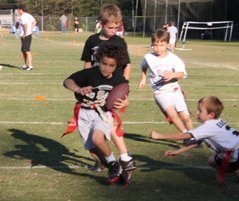Children Focusing on One Sport Year-Round
Is playing one sport necessary for my child to become an elite athlete?
Many parents will face this question at some point as their child progresses through competitive sports. What is the formula for making a great athlete? While no simple answer exists for this question, several factors need to be explored to arrive at the best decision for your child. Often referred to as “pigeon-holing”, this approach may be appropriate for some kids in some sports, but the sacrifices can also be detrimental to other kids. This blog will summarize the key points parents should understand or ask when making this difficult decision.
A. The first decision: assessing talent AND desire.
1. Assessing talent is the easy part:
- Success on the local, state, or national level will help determine your child’s potential for future success. In team sports, input from an experienced coach may also be helpful.
- Because children’s musculoskeletal systems are developing at different rates at early ages, most experts agree that the talent level at ages 13-15 are better predictors of future success than ages 10-13.

2. Assessing desire:
- CAUTION: the desire of the parent(s) can mask the desire of the child.
- An objective way of assessing desire is difficult. Many elite coaches will speak to the child or have them take a written exam to assess desire.
- Desire and determination are vital because of the amount of time that needs to be invested in practicing a sport in order to be successful. In his book Outliers, Malcom Gladwell states that an individual needs to spend 10,000 hours to master a specific craft.
3. While a combination of 100% talent and 100% desire is ideal, this occurrence is extremely rare.
- A child with 100% desire and 75% talent (“overachievers”) may eventually outperform a child with 50-75% desire and 100% talent (“underachievers”).
- There is no question that a child needs to have a high level of talent to be successful, but without 100% desire, success may EVENTUALLY be short-lived.
B. Second decision: What sport is your child considering?
1. Is your child involved in an individual sport, competing year-round (swimming/diving, tennis, golf, gymnastics)?
- Success in these sports is often linked to the practice time as well as the skill.
- The stories of Tiger Woods, Andre Agassi, Michael Phelps, and most gymnasts are well documented. Besides skill, they all committed themselves to their sports at a very early age and spent over the “magic 10,000” hours practicing their craft.
- Most athletes in these sports who have reached an elite level (college scholarship), have focused exclusively on one sport by the time they were 10-12 (or younger).
- BEWARE: The downfall of these sports, where success is predicated on making huge sacrifices from an early age, is the high rate of “burnout”.
2. What about the seasonal team sports? (Football, softball, baseball, basketball, soccer, volleyball)
- Although labeled “seasonal” sports, there are often travel teams and various leagues in most of these sports that enable a child to compete year round.
- A better case for playing multiple sports can be made for children competing in these sports. While these athletes may have a focus on one sport, they are often involved in other sports throughout high school.
- Even athletes, who receive college scholarships in these sports, often played multiple sports throughout high school.
C. What age is my child?
- Under the age of 10: While exceptions exist, most experts agree that “pigeon- holing” a child into 1 sport before the age of 10 is usually not a good idea for most kids. Psychomotor skills are continuing to develop at this age and multiple sports activities can be beneficial to overall athletic development. Conversely, playing a sport like baseball year-round (particularly pitcher) can result in detrimental changes to the immature musculoskeletal system.
- Ages 10-12: At this age, it MAY be appropriate to choose one sport if your child has the talent, desire, and competes in a year-round sport.
- Ages 13-15: By this age, it is easier to judge a child’s talent, desire, and potential in a specific sport. IF they want to excel in a specific sport, this is the ideal time to focus on that sport.
D. Summary:
- Most children under 10 should pursue multiple sports to allow for symmetrical development and determine the sports they like the most.

- At ages 10-12, if a child shows exceptional talent AND loves the sport, it is okay to begin to focus on a year round sport. However, they should never be denied the opportunity to be involved in other sports. While the choice to isolate one sport year-round can be guided by the parents, the choice has to be made by the child. Parents should understand the potential consequences of isolating one sport throughout the year (burnout).
- At ages 13-15, the level of talent is a good indicator of the child’s potential and IF the desire is there, this is the time to focus on one sport in hopes of competing on an elite level.
Should you have any additional questions regarding children in sports, please call one of our experts at The Sports Rehabilitation Center!